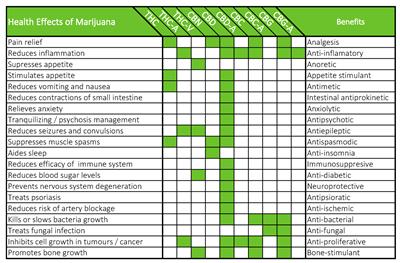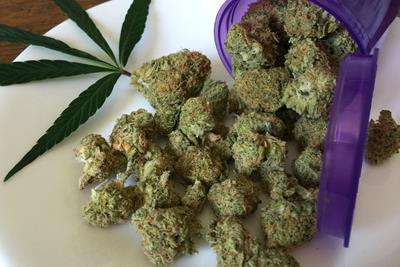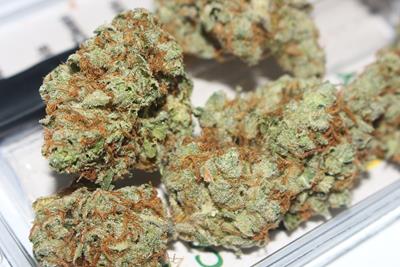
Friday August 11, 2017
By Morgan Smith
 Health/Science
Health/Science
There’s a popular belief that cannabis consumers are overweight due to the perceived “munchie” side-effect, causing them to consume huge amounts of calories. There is also a stigma of laziness and a failure to do any physical activity in order to burn those calories off. While many people believe cannabis consumption can cause you to gain weight, the real truth is quite the opposite. In fact, there are several studies linking cannabis usage to lower body mass index (BMI).
In case you’re unfamiliar, an individual’s BMI is the measure of body fat based on height and weight, regardless of age, sex or ethnicity. It’s used to measure and track a person’s weight status and generally identifies potential weight problems using the four categories of underweight, healthy weight, overweight and obese.
Body Mass Index and Cannabis
When it comes to the relationship between BMI and cannabis, a 2016 study in the Journal of Mental Health Policy and Economics found that “daily female marijuana users have a BMI that is approximately 3.1% lower than that of non-users, whereas daily male users have a BMI that is approximately 2.7% lower than that of non-users.” Another analysis of two national surveys found that 22-25% of non-cannabis users and 14-17% of individuals who used cannabis three days a week were obese, concluding that “the prevalence of obesity is lower in cannabis users than in non-users.”
Why? Your endocannabinoid system already controls your appetite and plays a role in your weight development and maintenance. Its connectivity to your central nervous system regulates food intake and sends signals to your brain and emotional core about when it’s time to eat. CB1 receptors control energy balance and body weight, affect neurons which regulate the “incentive value of food” and impact the organs that regulate energy metabolism. When you feel hungry, that’s the activation of CB1 receptors telling you to eat.

But when you introduce cannabis into your body, you’re presenting your endocannabinoid system with the cannabinoid tetrahydrocannabivarin known as THC-V. Primarily found in sativa strains, this specific molecular structure can comprise nearly 54% of a strain’s cannabinoid makeup.
THC-V and Appetite
So what is THC-V’s major role? Appetite suppression. Pre-clinical studies have shown that THC-V affects body weight, body fat, energy expenditure and other obesity-related measures. It’s the newest weapon against obesity and type 2 diabetes, as well as high cholesterol and concentrated fat storage. Biotech firms are even working to replicate and commercially produce this highly-sought-after cannabinoid without its psychoactive effects.
THC-V is a key factor in keeping weight off, but its effectiveness depends on the dosage. Because THC-V can manipulate our naturally occurring CB1 cannabinoid receptors, it can change how effective other cannabinoids are. Research shows that low doses of THC-V blocks CB1 receptors, which decreases the psychoactive effect of THC, whereas high doses of THC-V activates CB1 receptors, which triggers the entourage effect and creates a more powerful experience.
Blocking the CB1 receptor reduces feeding behavior, suppresses food intake and impairs weight gain.
Because of this, researchers are starting to dig into how blocking CB1 receptors can treat individuals with weight disorders. It may take a combination of factors and treatments, but cannabis can play a role in body weight reduction.
Is Cannabis the Key to Weight Regulation?
A variety of studies have also found that cannabis is associated with lower levels of insulin resistance. Insulin helps glucose (a.k.a. sugar) convert itself into energy but when resistance occurs, cells can’t respond to the insulin hormone and ends up taking less glucose out of the bloodstream. This causes sugar levels to rise and red blood cells to build up. Long story short, regular cannabis consumers can break down blood sugar easier, which helps prevent weight gain.
There’s no telling what the magic amount, frequency and strain may be to maintain a healthy BMI while using cannabis. Some reports say short-term use causes weight gain while others say chronic marijuana use helps you lose the pounds. Other substances may help or hinder the process and your current weight could determine if you’re more likely to gain or lose.
Smoking a joint a day won’t make your BMI perfect; you still need the proper exercise and diet routine to keep your weight in check.
If you’re interested in curbing your hunger, consider trying a high THC-V strain like Girl Scout Cookies or Super Silver Haze. It’ll help activate your CB1 receptors and break down sugar to regulate your BMI and overall weight.







